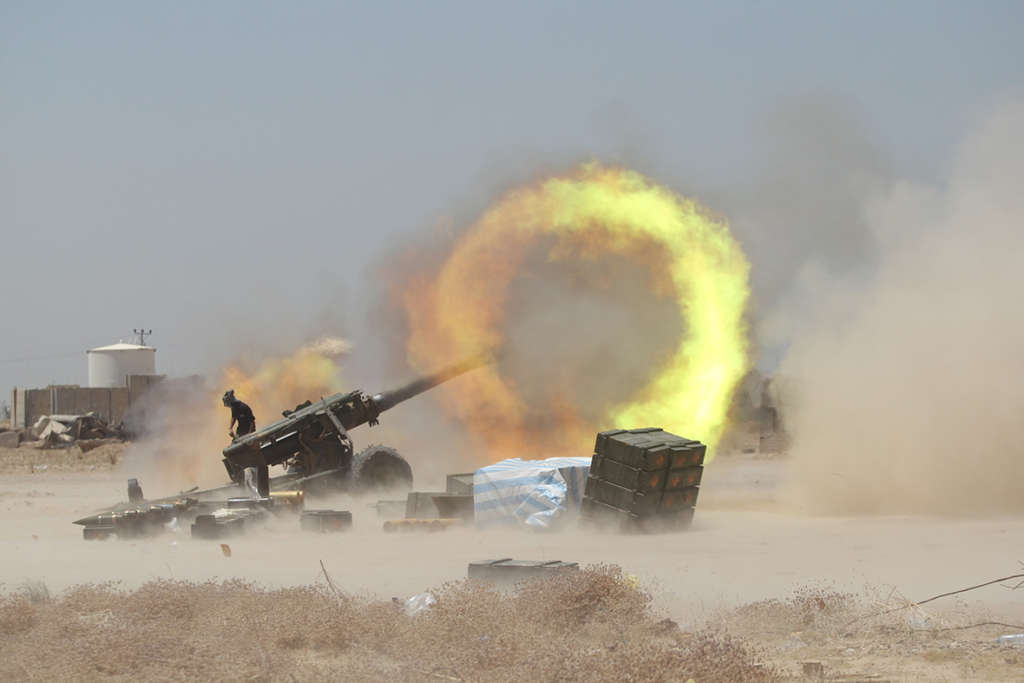Near Fallujah (Iraq), New York Times-Along the battle line north of Fallujah, small units of Shi’ite fighters are raining mortar shells and rockets down on the city and its ISIS occupiers.
The battle in Fallujah has become entrenched outside the city itself. Iraqi forces surrounding the area have been bogged down by a fierce ISIS counterattack.
Few civilians managed to escape the city as the fighting closed in, but the status of tens of thousands still trapped there is an urgent question that remained without a definitive answer until this moment.
Some parts of the extended battlefield are lush with date palm trees, these views are familiar to anyone who watched television images of American Marines fighting over the same territory more than a decade ago.
However, mostly, the land has become brown and dehydrated, scarred by the fighting. There is a charred tank, split in two, sits at an intersection in the city, and smoke is always rising in the distance, due to an airstrike, a mortar or a car bomb.
The landscape has also been gutted by an elaborate network of tunnels- some of which have been hit in recent days by American airstrikes- that ISIS was able to construct while it held the area for more than two years.
To get close to the front, a New York Times reporting team met officials from the Badr Organization, a longstanding Shi’ite militia backed by Iran, at a street corner in Baghdad outside a shawarma shop on Sunday morning.
Within the base, Iraq’s fragmented security forces occupied different areas: Iranian-supported militias in one place; the elite Iraqi Army counterterrorism forces, which work closely with the United States, in another; and Sunni policemen from Fallujah, who are scheduled to hold the city once it is taken from ISIS, yet in another space, some of the men lounging in tank tops or fixing their vehicles.
Near the front, one of Badr Organization’s fighters spoke of the forces’ progress in Fallujah’s outlying areas.
“I am amazed at the advancements so far,” he said. “We expected it to be a long vicious battle.”
Still, the real fight — taking the city street by street — has not yet begun, and the fighter said the battle might be slowed to allow civilians to leave.
“We have a big concern for the lives of civilians inside Fallujah,” said the fighter from Badr Organization, mindful of the sectarian tensions that have been heightened with the battle, as a mostly Shiite force converges on a Sunni city. “There may be a delay to allow civilians to leave.”
That would parallel what happened during the first battle for Fallujah, in April 2004, when American forces began assaulting the city, only to pull back because of concerns about civilians being killed.
Then, Fallujah became a perfect example for the United States’ failure to pacify a growing insurgency, and it was not until seven months later, in November, that Marines moved in and cleared the city in a battle that cost nearly 100 American lives.
The battle in Fallujah now unfolding is being fought by a jagged constellation of government security forces, Shiite militias and Sunni tribal fighters. They are closing in on the city from the north and south, but not yet fighting for its center.
Still within Fallujah are an estimated 50,000 civilians, long cut off from shipments of food and medicine by a government siege and now under artillery fire as the front lines have tightened around the city.
The Norwegian Refugee Council on Tuesday warned of a “catastrophe unfolding in Fallujah,” saying that humanitarian conditions were “rapidly deteriorating as fierce fighting intensifies.”
Moreover, the United Nations, based on informers in the city, warned Tuesday that civilians were being killed from shelling by pro-government forces, including seven members of one family a few days ago.
Lise Grande, the top United Nations humanitarian official in Iraq, said in an interview, “I am desperately worried about what is happening to civilians in Fallujah.”
Grande said that informers inside the city had told the United Nations that ISIS militants were moving families to the city center to serve as human shields.
Families who have been able to leave have reported severe food shortages and a lack of clean water, raising concerns, she said, of a cholera outbreak.
Statements that commanders gave to the news media on Monday falsely asserted that they had entered the city and were fighting for it. Yet on Tuesday it was clear that their advance had stalled in the face of stiff resistance from ISIS.
On Tuesday afternoon, as it became evident that no quick victory was at hand, Iraq’s Joint Operations Command, a central hub for the army, federal police and militias, urged the news media to be careful: “We warn all of the mass media to be accurate with the news about the military operations for the Fallujah battle, and not to be hasty in publishing information and news and to check the sources of the news before publishing them.”
